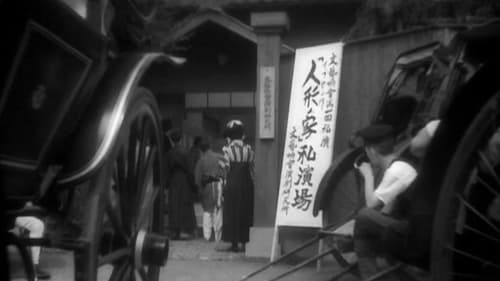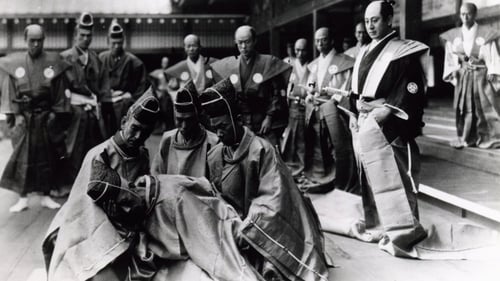
Shimizu no Jirocho
The tale of a feudal swordsman who cynically takes no responsibility for anything, relegating it to others, and then taking the credit.

The stage director Shimamura, who is bringing western theatre to Japan, falls in love with the outspoken actress Sumako Matsui, and leaves his family to be with her, while trying to keep his Art Theatre solvent.

Heihachirô Kondô
In 1701, Lord Takuminokami Asano has a feud with Lord Kira and he tries to kill Kira in the corridors of the Shogun's palace. The Shogun sentences Lord Asano to commit suppuku and deprives the palace and lands from his clan, but does not punish Lord Kira. Lord Asano's vassals leave the land and his samurais become ronin and want to seek revenge against the dishonor of their Lord. But their leader Kuranosuke Oishi asks the Shogun to restore the Asano clan with his brother Daigaku Asano. One year later, the Shogun refuses his request and Oishi and forty-six ronin revenge their Lord.

In late 19th century Tokyo, Kikunosuke Onoue, the adopted son of a legendary actor, himself an actor specializing in female roles, discovers that he is only praised for his acting due to his status as his father's heir. Devastated by this, he turns to Otoku, a servant of his family, for comfort, and they fall in love. Kikunosuke becomes determined to leave home and develop as an actor on his own merits, and Otoku faithfully follows him.

dir: Teinosuke Kinugasa

Daikan
An onnagata (female impersonator) of a Kabuki troupe avenges his parents' deaths. Remade in 1963 as Yukinojô Henge.

Period film from 1934.

Jidaigeki film, only a fragment remains of the original film.

Yaji and Kita: The Battle of Toba Fushimi is a 1928 Japanese film directed by Tomiyasu Ikeda.[1] This comedy film showcases the acting talent of Denjirō Ōkōchi and acts as a complementary film to Yaji and Kita: Yasuda's Rescue, which is part of the Yaji and Kita series. An 8-minute remnant of the film was released on DVD by Digital Meme with a benshi accompaniment by Midori Sawato. The version in the National Film Center is 23 minutes long.

Sozenji Baba is a 1928 black and white Japanese silent film directed by Masahiro Makino. It is an ambitious film in which Makino deals with the difficult issue of the agony of a person who killed for revenge.

All that remains of the first Samurai Town Story is the concluding battle.

Toshizo Hijikata
Yaji and Kita: Yasuda's Rescue is a 1927 black and white Japanese silent film directed by Tomiyasu Ikeda.[1] This comedy film showcases the comic talent of Denjiro Okochi, which contrasts markedly with his heroic performance in Oatsurae Jirokichi Koshi. The humorous exchanges with Goro Kawabe, his senior at Nikkatsu, can be priceless, with the expressions and movements of the two goofy characters making for pure, hilarious slapstick comedy. A 15-minute remnant of the film was released on DVD by Digital Meme with benshi accompaniment by Midori Sawato and Ryubi Kato.

Akira Naruse / Gorô Katayama - Private Detective
One of Mizoguchi's first films, considered lost.

Directed by Kensaku Suzuki.

Tsurikichi
A small town boy dreams of being a famous fiddler; Meanwhile, two convicts escape from prison and hide in the woods.







